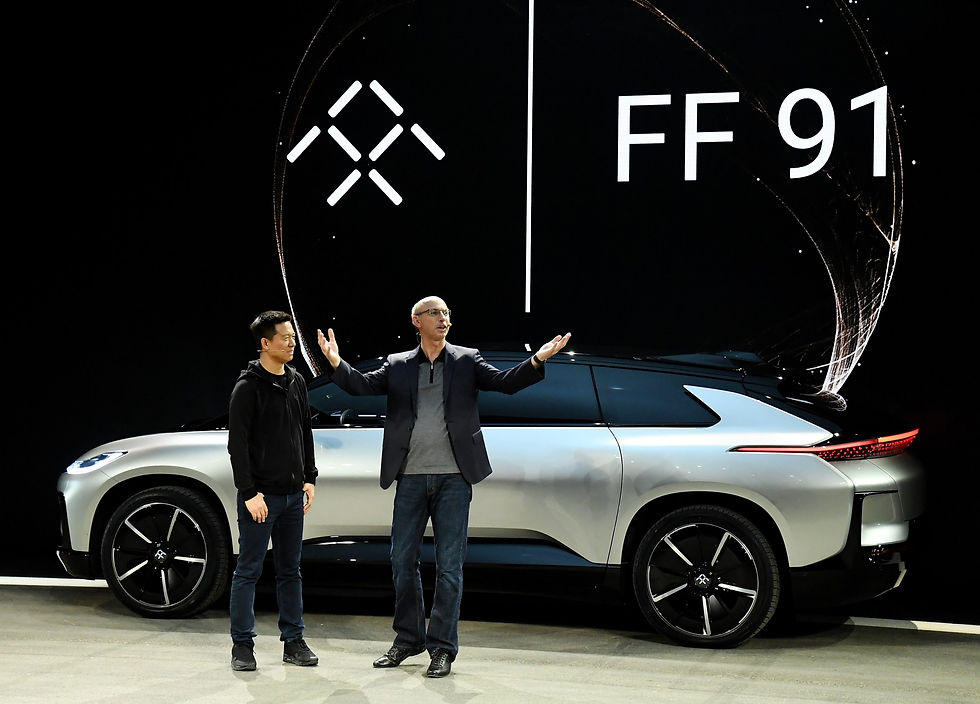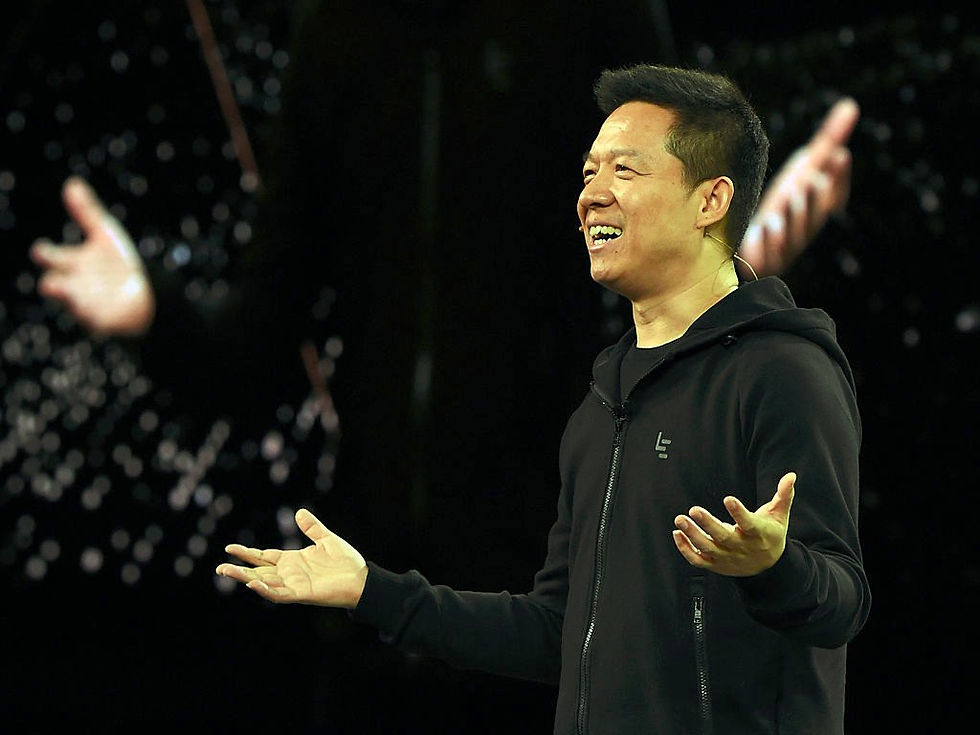Death by lack. If CES doesn't find investors fast, its over!
- Davinci
- Jan 19, 2017
- 3 min read

Faraday Future, the electric-car startup once hyped as a "Tesla-killer," was getting a second chance. It had to get this one right. Early this month, a roster of company executives and Faraday's most visible investor, Chinese billionaire Jia Yueting, gathered at the International Consumer Electronics Show in Las Vegas, the annual mega-showcase for the technology, electronics, and auto industry's buzziest new products, from drones to TVs to self-driving cars. For Los Angeles-based Faraday Future, it was a chance to prove to the world that the company is for real, after its first appearance at CES in 2016 raised more questions than it answered. The startup had unveiled a sleek autonomous prototype, but the vehicle turned out to be an inoperable one-seat race car that might never be built — hardly a challenger to Tesla's growing fleet of electric vehicles that the tech press had been hoping for. So in 2017, nearly three years after its founding, and after the company had poached talent from Silicon Valley and Detroit and ballooned to 1,400 employees, Faraday Future needed to show it could produce a real car. Instead, its second attempt has been largely deemed a flop. The company does have cars that can drive, but it struggled to prove that on the CES stage. It was, perhaps, a fitting end to a year of turmoil for Faraday and a moment of glee for its critics, including recently departed employees.
Business Insider interviewed eight people with intimate knowledge of Faraday Future's business to learn about the state of affairs leading up to the CES presentation. All the executives spoke on condition of anonymity so that they could speak freely.
They described a business in shambles, with more than a half-dozen senior executives departing since last spring — including Faraday's global CEO, who had left just before CES. The current and former Faraday insiders also describe millions of dollars in unpaid bills, and a chaotic corporate structure between Faraday's US and Chinese operations. The most immediate of Faraday's problems is its cash shortage, insiders said. "If CES doesn’t bring in fresh investors, it’s over between February and May," one source close to the company told Business Insider.
The accounts in this story were presented to representatives for Faraday Future and its Chinese partner LeEco, who described the accounts as speculation and declined to comment further.
Where is the Money?

Unpaid bills are piling up. Money owed to suppliers alone adds up to about $300 million, executive-level sources told Business Insider. As BuzzFeed News' Priya Anand reported in December, at least two companies have sued Faraday over unpaid bills, although one of those cases has already been dismissed.
Jia, according to the sources, pushed teams to keep spending money at 100% but leaves them in the dark about sources of funds.
"There was no visibility about when the money would arrive — we were told to continue making commitments to suppliers," a source at the company said, adding that Faraday got about 10% of the money it needed each month, "only $10 to $15 million."

According to another executive-level source, Faraday was seeking help from Chinese investors who were due to visit the company after its CES presentation earlier this month. On multiple occasions over the past year, Faraday's US spokespeople have told Business Insider that the startup employs a "diverse funding strategy," but the company had repeatedly declined to specify who, besides Jia, has invested in the company.
The sources Business Insider spoke with did say that Faraday raised a $1 billion convertible bond in China last year, but that the company is still working on getting the funds across the border. The Chinese government, worried about the record outflow of yuan from the country, has imposed restrictions on the overseas transfer of funds by both companies and individuals, and Business Insider's sources say Faraday's top executives were wary of increased scrutiny from the Chinese government if it sought approval to convert that money from yuan to US dollars.
Jia admitted in November that he had gotten in over his head with all the projects, writing a letter to employees apologizing for moving "blindly" ahead, Bloomberg News reported. "Our cash demand ballooned. We got overextended in our global strategy. At the same time, our capital and resources were in fact limited,"
Jia's letter read. In a deal announced last week, LeEco said it would raise about $2 billion by selling a stake to a Chinese real-estate developer called Sunac China Holdings. The stake sale means LeEco's own cash crunch is almost over, but it won't help the electric-car business, China Daily cited Jia as saying:
"Sunac is our second-biggest shareholder. We will explore how to use the internet to fuel its real estate businesses," Jia said, adding that its electric-car unit would start looking for investors.







Comments